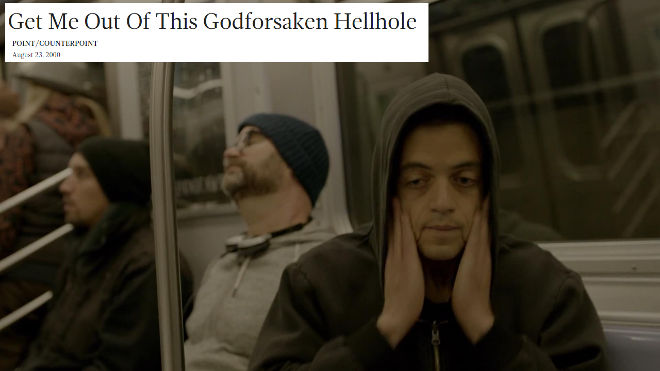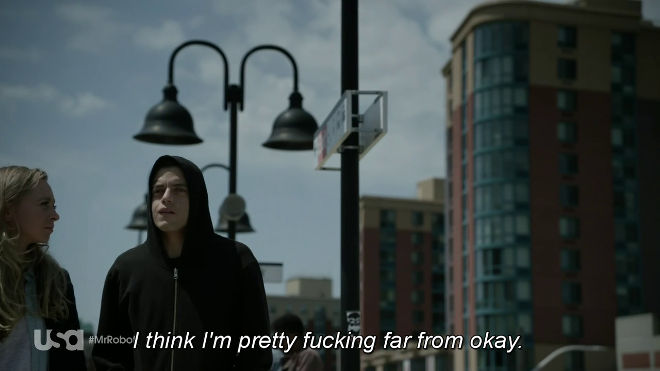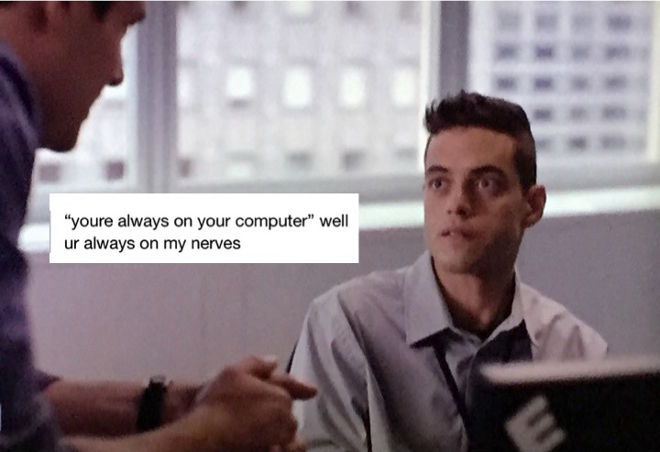In The Age Of Assange And Snowden, ‘Mr Robot’ Is The Dystopian Hacker Thriller We Need
Perfect for all your 1% revenge fantasies.

One-third Occupy movement, one-third Egyptian revolution and one-third massively multiplayer online first-person shooter game, USA Network’s newest drama-thriller television series Mr Robot (currently available on streaming service Presto) is a thrilling, uncomfortable and visceral exploration of power and the impact of money, freedom and ownership in the capital of capitalism, New York City.
Elliot Alderson (Rami Malek), our less ‘unreliable’ more ‘outright unstable’ narrator, is addicted to morphine but insists on taking suboxone, a drug to treat opiate addiction, at the same time. He spends his spare time hacking into the biggest corporation in the world, E Corp, in an attempt to “release the world from their illegitimate debt prisons” — all while working as a cyber-security engineer contracted to protect E Corp from the very cyber attacks he conducts against them.
–

Meet Elliot Alderson
We first encounter Elliot in the cold open of episode one, a scene at Ron’s Coffee Shop where Elliot introduces himself to the eponymous Ron. But Ron’s not his real name – his real name is Rohit Mehta. Having hidden his ethnicity to succeed in America, Rohit has amassed 17 coffee shops and counting.
But as with all monetary success in Mr Robot, the sheen of success hides a deep rottenness beneath. Elliot has hacked Rohit’s computer network and tells him that he’s discovered 100 terabytes of child pornography and the network of 400,000 users Ron shares it with. It would be easy for Elliot to treat him with contempt, but instead Elliot empathises.
“I’m very different too,” he tells Rohit — “I mean, I don’t jerk off to little kids, but I don’t know how to talk to people” — before laying out what becomes the foundation of his character: “My dad was the only one I could talk to. But he died … Leukemia. He definitely got it from radiation at the company he worked at, though I couldn’t prove it. Now he’s dead. Company’s fine, though.”
The dichotomy of his vulnerability and humanity against the unfeeling power of capitalism gives a tangible weight to every act and choice made in Mr Robot. It is subtly threaded throughout even the smallest of scenes, and against the backdrop of an anarchic revolutionary group trying to bring down capitalism, it ensures we see that this is not just the means with which the system will be brought down, but also the reason for it.
Rohit believes Elliot is trying to blackmail him and offers to pay him whatever he wants for his silence. But Elliot has already tipped off the police. The layering of ethical considerations and conflicts sets up the themes of Mr Robot: how identity and reputation are both a shield and a weapon that others can use against you; how humanity and connection are fraught but all the more important within a society that twists and subverts them; and the difference between the law, collective morality and personal ethics.
–

The Struggle Is Real
Soundtracked by a collection of overtly electronic dance music and rap/hip hop (punctuated by atmospheric sounds almost identical to those in Fight Club and Donnie Darko), the world of Mr Robot has not just youthful energy but a life or death urgency driving its characters. Elliot’s day job boss has the look of the dad from Family Ties born 30 years too late – his warm, fatherly face is constantly pinched and harrowed with stress. He talks about the anxiety of his relationship with the same intimacy and import as he does his concerns about his work – evoking the emotional closeness we all share with corporations and lovers alike.
Elliot’s best friend Angela is trying desperately to pay off her student loans. She saves the size of her loans back two dozen times over in one night and is patronisingly given only a paternalistic “well done” from the sexist E Corp executive. When she stumbles over a word in a presentation, he fires her from his account on the spot. Though not himself – he makes someone else do it for him.
Unlike shows like Daredevil or USA Network brother show Suits, Mr Robot ensures there is gradation in its depictions of disadvantage – class-based in the storyline of Elliot’s drug dealer and girlfriend, Rohit’s decision to conceal his race in order to sell his business, Angela not just being fired but being called “girl” and told to literally suck the balls of the man who signed off on her mother’s and Elliot’s father’s deaths. There’s not just a sense of injustice, it’s like watching your friends trying to climb out of The Pit in The Dark Knight Rises whilst knowing none of them are or will ever be Bane.
Part of me wants to say that the show is not as stressful and unpleasant as it sounds, that it’s also compelling and fascinating and bold, but that would be a betrayal of the heart of Mr Robot. It IS stressful and uncomfortable, and outright nauseating to watch, because it strips away the veneer – and reminds us, constantly, that it is nothing more than a thin, filmsy veneer – of capitalist freedom from the world and shows exactly how all the human bones are ground to make our favourite fast foods.
–

Image via Lewrenix/Tumblr.
Capitalism is the Worst. Boyfriend. Ever.
In creating such a conflicted and conflicting anti-hero in Elliot, Mr Robot uses his and other characters as ciphers for exploring the danger of corporate power. It reflects back to the viewer our hypocrisy – the things we see individuals do horrify and disturb us, but when done by faceless corporations offscreen, we don’t feel the same jolt of violated humanity. We let them off the hook. Elliot spends his time hacking info about the people around him, but finds out no more or less than corporations take freely from us every day with our passive consent — consider Facebook’s controversial real name policy, or if you’re feeling adventurous, check out your Google search history here.
Elliot’s attempts to control his addiction dovetail perfectly with his attempts to bring down capitalism while still trying to survive within it, his duality serving as a riposte to the idea of young people “selling out”. Not only is no one buying the ethos that capitalism’s selling anymore, Elliot and his ilk only continue to work on what they believe in because it’s worth believing in – as a way of fighting against the system which locks them out. His choices and experiences capture the way the late capitalist prison-industrial complex forces people to split their selves into often diametrically opposed pieces in order to survive as a whole.

Malek’s childlike gaze slides from wonder to trauma-frozen to blankness and back like the slow rotation of a Ferris Wheel and we’re made to wonder exactly what it was in his past that created this vulnerable yet dangerous young man. But what of the similarly opaque origins of big business – corporations created, dissolved or rebranded to do away with any unpleasant associations and reborn anew to demand our money and trust and loyalty?
Think of the creeping intellectual imperialism of demanding that workers be “passionate” about their jobs. Think of the almost hysterical irony in asking someone to “love” their job when it is something they need to do to survive – like demanding a five-star review on Yelp for giving a dehydrated person Hydralite on their deathbed.
Think of the absurdity of having to write “Opinions are my own and not the views of my employer” on your Twitter page – as though the contents of your very head must be checked and rubber stamped before you dare share them out loud. If it were an individual, a housemate or a boyfriend demanding you be passionate, loving and constantly consider how your thoughts and feelings are perceived as a reflection on them, you would run and never look back.
With settings like abandoned carnivals and huge corporate buildings filled with miles of rooms and corridors, Mr Robot feels very much like a computer game. Characters are constantly trying to play their best move or find out what their opponent’s ‘ask’ is. But it never seems playful or frivolous. The games are all deadly serious. Like some strange inversion of the drone pilots dropping bombs on Afghanistan from offices in New Mexico, the absurdity of the surface belies the seriousness of their quest to bring down capitalism. They are young men and women playing Deep Blue for stakes of life and death.
As with all the dualities of Mr Robot, it seems like it’s their inherent humanity which puts them at a disadvantage. But it’s actually their strength. Corporations can demand “passion” or “love” for their jobs, can see people only as “employee numbers that brand us as their own” (note the duality of the word ‘brand’, too) – but there’s no equivalent of the Turing test for making people care.
Elliot can empathise with Rohit; Angela and Elliot with one another; Angela even with the executive responsible for her mother’s death – it’s humanity and empathy that give them the advantage in changing the world. And, in one last example of Mr Robot’s constant duality, it’s also the very thing worth changing the world for.
–
–
Courteney Hocking is a Melbourne writer and reformed comedian who has written for Good News Week, The Guardian, The Age & Crikey. You can find her general smart-arsery & Hannibal memes @courteneyh